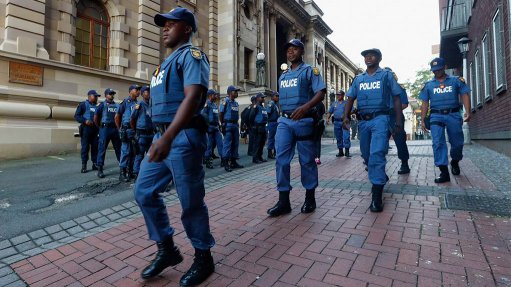
Ahead of President Cyril Ramaphosa’s much anticipated Cabinet announcement, the Institute for Security Studies (ISS) called on the Government of National Unity (GNU) to prioritise a targeted programme of reform that measurably improves policing over the next five years.
The ISS said it had been concerned, since 2012, by evidence that the South African Police Service’s (Saps’) organisational performance and general policing in South Africa were in a state of decline, highlighting that after more than a decade of rising murder rates, improving public safety was critical for the country’s future.
Speaking during the launch of its report on recommendations to strengthen the Saps, ISS justice and violence prevention head Gareth Newham said he believed that a more effective Saps, that better uses its vast resources to improve public safety, was entirely possible.
South Africa has the necessary skills and resources, he said, and added that a Cabinet that prioritised improving the police, in line with the GNU priority to strengthen law enforcement agencies to address crime, was needed.
He noted that firearm crime and violence should be the initial focus of an Saps strategy to substantially reduce murder and violent organised crime.
The ISS said that, as with serious violent crime, the leaders behind the main organised crime networks constituted a small proportion of the population, highlighting that disrupting organised criminal networks required the targeted use of specialised intelligence, and forensic and investigative capabilities to trace illicit goods and money flows, and ensure that these kingpins ended up in prison.
“These capabilities already exist to some extent in the Saps. But they need to be strengthened through targeted measures aimed at ensuring that the good work that many Saps members are doing is effectively supported and replicated,” explained Newham.
He said that the ability of the Saps to solve cases had declined across most crime categories for more than a decade, noting that 31% of murders were solved in 2012, while only a paltry 12% of murder cases were solved in 2023.
“This does not mean they are solving fewer cases, it means they are probably solving several cases but that murder cases are going up. The consequence is that the proportion of people who are involved in murdering people that get away with it, are increasing,” he said.
He noted that the Saps must ensure that all detectives had the right characteristics, training and resources to solve cases and help the National Prosecuting Authority put those that commit the most harm in prison.
The ISS wants the Saps to review and structure its crime intelligence to ensure that its resources are effectively used and that proper intelligence is available to detectives, particularly those investigating organised crime and corruption.
It must ensure that irregular appointments were addressed and that there was no doubt about the integrity of any person deployed to crime intelligence, Newham said.
The ISS said the high levels of police corruption and criminality must also be addressed as a matter of urgency, calling for the establishment of dedicated disciplinary units that focussed on tackling police misconduct and ensuring expeditious processes for hearings and dismissals.
Newham said the Saps anti-corruption unit must be strengthened to have resources and capabilities not less than the unit that existed before its closure in 2002.
He said by reducing police corruption, the Saps could increase legitimacy and public support.
Newham said a modernised, digitised and skilled Saps was key, adding that the Saps must strengthen the overall quality of recruitment and focus skills needed at all levels, not only large numbers of boots on the ground.